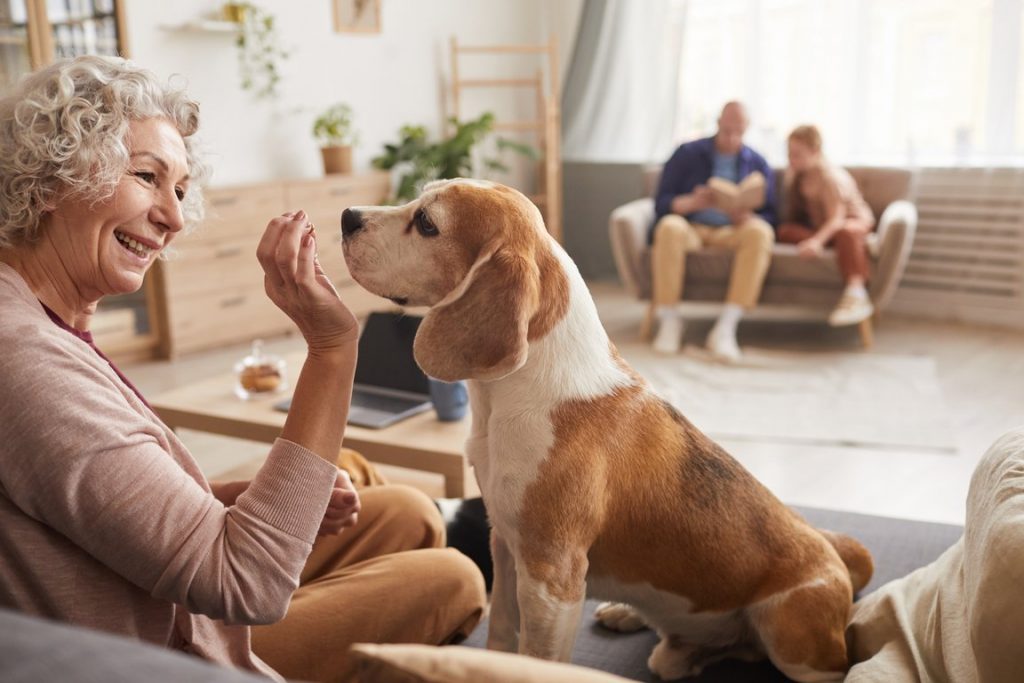As dogs age, they share many of the effects associated with ageing in humans. These might include an increase in aches and pains, arthritis, poor digestion and failing senses. By considering adjustments to their normal routine, we might potentially improve our senior dogs’ quality of life and general well-being.

As a result of improved nutrition and veterinary care, dogs are living longer. Currently, most dogs are considered senior when the reach about eight years. Large and giant breeds have a shorter lifespan and may be considered seniors after five to seven years.
Senior Dog Diet and Weight
Today, there is a much clearer understanding of how exercise, gut microbiome and obesity affect health. As dogs become less active, their microbial balance changes and weight increases. It is understood that by increasing exercise, the microbial structure reverts, and weight is lost. This means that one of the best things we can do for our senior companions is to maintain a sufficiently high level of gentle exercise in order to keep body weight under control.
Being overweight increases the likelihood of our senior dogs suffering from heart disease and diabetes. It also places unnecessary strain on hips and joints. Many older dogs gain weight due to a reduced amount of exercise and so it is crucial that senior dogs remain active and undertake regular, short and gentle walks, according to their health and ability.
Joint health is one of the major limiters to exercise in older dogs. Arthritis is an inflammatory response disorder and so it is extremely important that the diet of senior dogs is neither excessively carbohydrate based, nor reliant on high levels of protein. Joint health supplements can be of great assistance for senior dogs, but a far better approach is to feed for health throughout life and minimise the severity of joint inflammation in old age.
There is an inevitable deterioration in gut digestive efficiency, due either to the changes to the microbiome, or as a result of the digestive system simply wearing out. An appropriate diet will be increasingly dense food that is highly digestible. The food should be specifically balanced for an older dog’s nutritional requirement. Food that is designed for muscle maintenance rather than one that is formulated for growth should be given to senior dogs. Senior dogs benefit from a diet lower in calories, protein and fat, but is higher in fibre.
Gradual weight loss in an apparently healthy dog could be symptomatic of an underlying medical condition. By regularly recording their weight, we can spot any changes that can then be discussed with a veterinarian.

Caring for Senior Dogs in Winter
Senior dogs need to be kept warm in cooler months. It is important that we provide them with a cosy, but supportive bed away from draughts. Beds with an orthopaedic foam mattress will provide a stable base that will help ease the pain of stiff joints and a bed with soft bolstered side walls will provide soft walls on which to lean, or to rest their heads. If your dog has mobility issues a bed with one low side will make it easy to get in and out.
By placing a pet-safe heat pad under the covers, we can help add some extra warmth.
Easily removable and washable covers will help maintain hygiene.
It is important that we continue to take our senior dogs outside for daily exercise, even though it may be cold. Senior dogs need to keep their muscles and joints moving and short, gentle walks will also help with weight management. On this point, feeding smaller meals throughout the day, instead of one large one will help with digestion and provide a continuous source of energy.
Senior dogs with short coats, or low body fat will benefit from a suitable jacket to help keep them warm. In wet weather, a water-resistant jacket should be used as this will help maintain body temperature.
Deteriorating Health
Remember that senior dogs can suffer from many of the ailments that affect humans. Cancer, diabetes, dental disease, kidney failure, and loss of vision. Many of these conditions can be managed if detected early and so it is recommended we take our senior dogs to a veterinarian for a thorough check-up every six months.
It is important that we watch for signs of difficulty in getting up, climbing stairs, or getting into the car. These can be signs of pain caused by arthritis, or another underlying medical issue.
As with humans, old age often leads to sight and hearing becoming impaired. Senior dogs may no longer react in the same way to familiar sounds and may even become difficult to wake up. They may no longer recognise us from a distance.
Unfortunately, some dogs become confused, disorientated and forget basic toilet training. They may bark, or howl, or become uncharacteristically aggressive. A consultation with a veterinarian is recommended if any of these signs become apparent. Some animals can suffer from a dementia-like illness.
It can be heartbreaking to see our beloved companion succumb to the signs of aging, but by making sure that they have the correct diet, sufficient gentle exercise and a suitably comfortable place to rest, we can provide them the care that they deserve.
